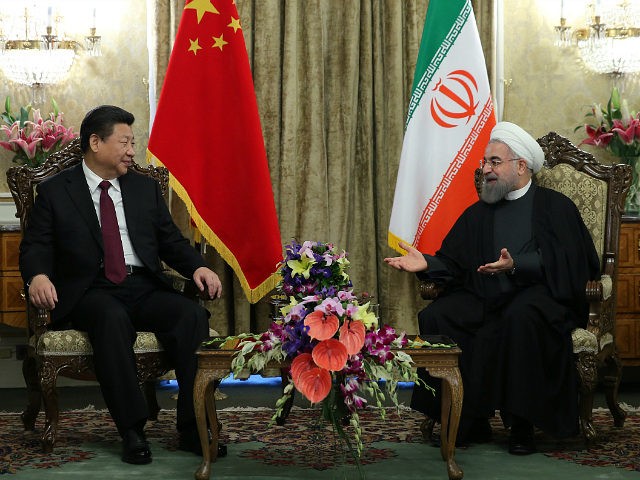Chinese Communist Party leader Xi Jinping declared on Wednesday that Beijing remains committed to developing a “strategic partnership” with Iran, which the United States has designated as the world’s leading state-sponsor of terrorism.
“No matter how the international and regional situation changes, China’s resolve to develop a comprehensive strategic partnership with Iran will remain unchanged,” Xi proclaimed during a meeting in Beijing with an Iranian delegation headed by the Middle Eastern country’s Parliament Speaker Ali Larijani, according to Turkey’s state-run Anadolu Agency (AA).
Xi claimed his support for Tehran is intended to help bring peace and stability in the Middle East.
“The two countries need to further deepen strategic mutual trust and continue to extend mutual understanding and support on issues involving each other’s core interests and major concerns,” China’s communist leader said.
Larijani reportedly stressed the need to boost China-Iran ties.
“Strengthening bilateral friendly cooperation is not only in the interest of the two countries but also important for peace and stability in Asia and the world,” he proclaimed.
“Iran is keen to deepen mutual trust and promote pragmatic cooperation with China,” he added, emphasizing the need for Tehran and Beijing to back one another in international and regional spheres.
“No country can damage Iran-China relations,” Larijani declared.
On Tuesday, China’s foreign minister met his Iranian counterpart in Beijing to discuss relations, including ways to preserve the controversial 2015 nuclear deal between Tehran and U.S.-led world powers, including China.
Trump pulled the United States out of the pact last year, arguing that it failed to restrain Tehran. The U.S. president re-imposed sanctions suspended under the accord and implemented a wave of additional restrictions on Iran.
Western officials have accused China of helping Iran evade sanctions. Beijing has said it remains committed to the deal.
In February 2018, Gen. Joseph Votel, the top American commander in the Middle East, warned that China is pursuing deeper cooperation Iran, adding at the time that the suspension of sanctions under the controversial nuclear deal facilitated that relationship.
The Chinese state media outlet Global Times confirmed in May 2018 that Beijing was seeking to enhance its activities in the Middle East in response to Trump’s decision to annul America’s participation in the Iran nuclear agreement and ultimately replace the United States influence in the region.
Arguing that the United States poses “the biggest threat to humanity,” the Iranian and Chinese militaries in July 2018 discussed ways to enhance defense ties.
On Tuesday, Iranian Foreign Minister Mohammad Javad Zarif noted that Tehran is interested in taking part in Beijing’s ambitious Belt and Road Initiative (BRI), also known as One Belt, One Road (OBOR) — a network of sea and land routes seeking to connect China with the rest of Asia, Europe, and the Western Hemisphere along one route.
U.S. military officials consider the OBOR a threat to American national security, arguing that China is using it to expand its influence and nefarious activities.
“We consider the comprehensive strategic partnership between Iran and China as one of our most important relations,” Zarif reportedly said during his meeting with his Chinese counterpart in Beijing.
Iran maintains a military presence in Syria in support of Russian-backed dictator Bashar al-Assad that threatens American troops in the region, the Pentagon’s inspector general reported late last year.
In the wake of the U.S. military withdrawal from Syria announcement late last year, the White House indicated the Trump administration may leave behind a residual presence in Syria to combat the lingering Iranian threat.
Reportedly, the Chinese military is also helping Assad and Russia fight Sunni jihadi groups in Syria that include Chinese Uighur Muslims, marking a departure from Beijing’s traditionally isolationist foreign policy. China also wants Syria to be part of its BRI project.
“The U.S. withdrawal from Syria could allow Beijing to further assert its role as a key international partner in Syria and, by extension, further Chinese interests in the Middle East that can help China realize its potential as an assertive power capable of operating outside of its traditional sphere of influence,” an editorial published by Lawfare last week noted.
In late November, the Uighur al-Qaeda-linked jihadi group Turkistan Islamic Party (TIP), a faction of the Hay’at Tahrir al-Sham (HTS) that controls most of Syria’s Idlib province, declared an Islamic emirate in that region.
A top Syrian Kurdish leader told Breitbart News earlier this year that the international community is not doing enough to combat the al-Qaeda threat in Syria. The international community’s near single-minded focus on defeating the Islamic State (ISIS/ISIL) has allowed its enemy al-Qaeda to surface as the most dominant jihadi group in Syria.

COMMENTS
Please let us know if you're having issues with commenting.